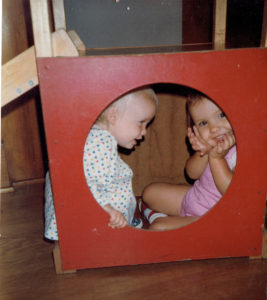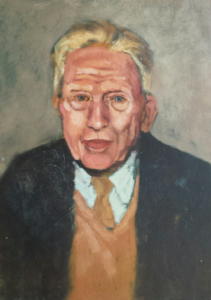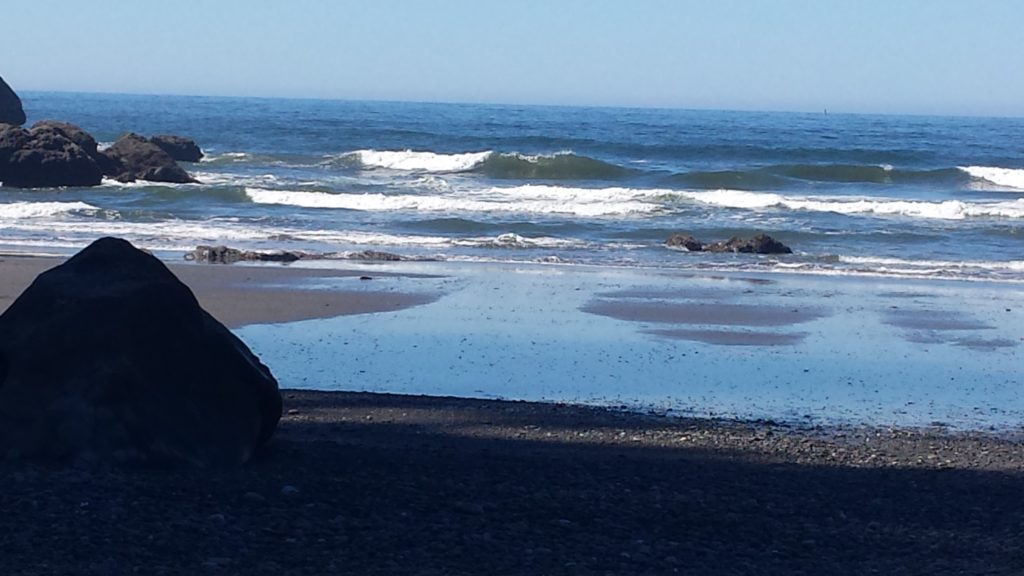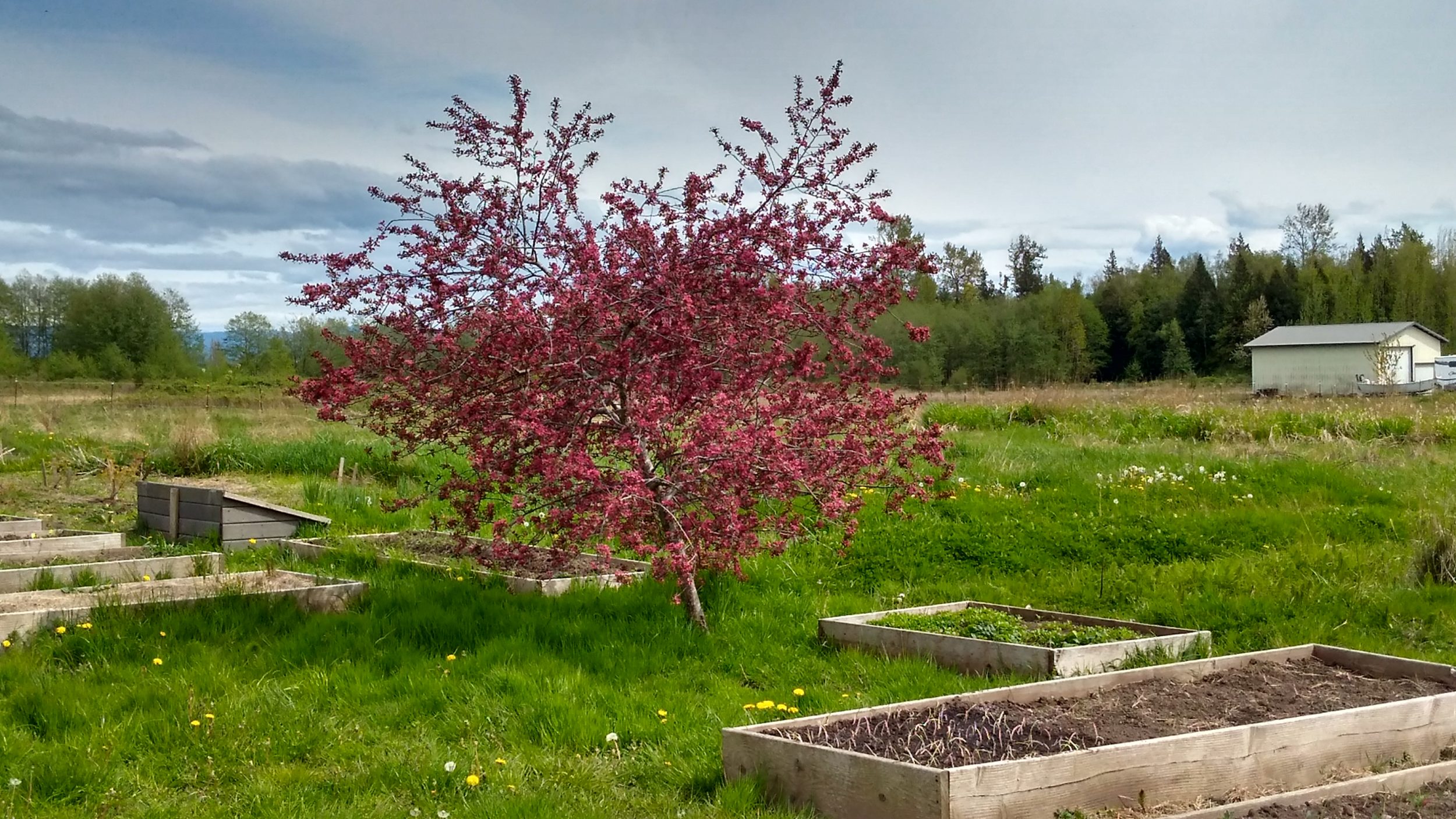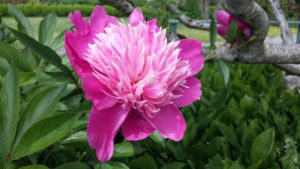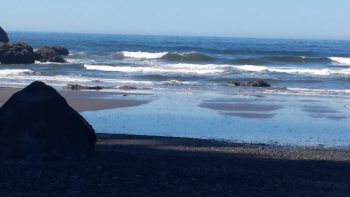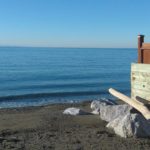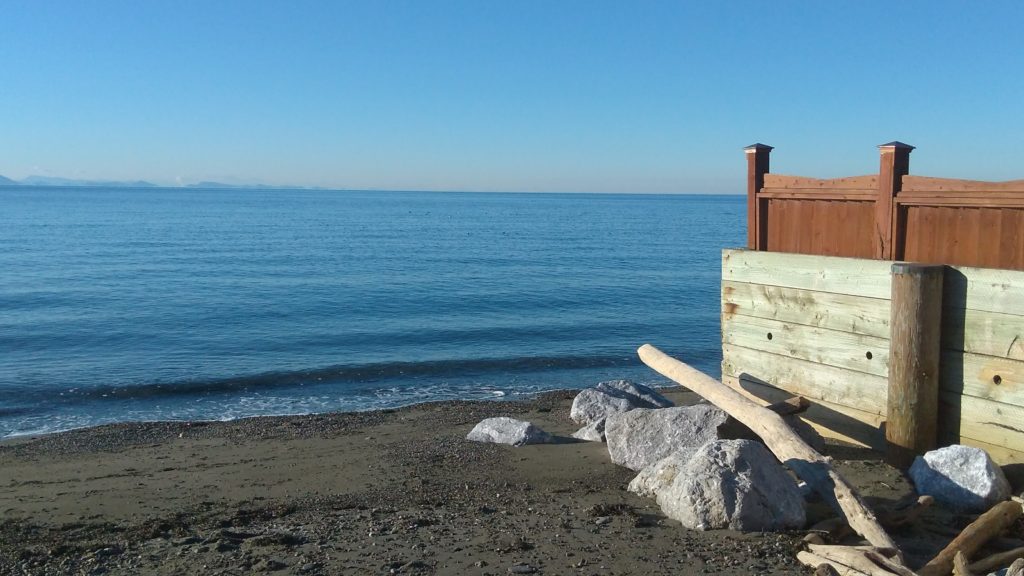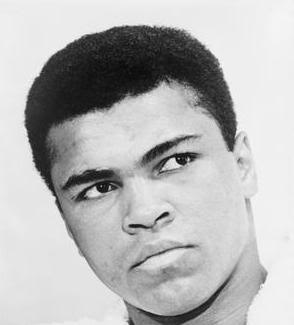A few days ago it was my daughter’s birthday. Somehow we old women delight in thinking of the adults we still call our children as the babies they were, bald and plump, eyes shining. Even now that these same adults have extraordinary interiors about which we gain only a clue now and then, we love to think of the very beginning, the seeming essence of what they are now, their very beings.
All those years ago when I was five years younger than she is now, I walked with her most evenings, she tucked in against my chest in one of those demin Snugli carriers, then a novelty, through the streets of our new home in Long Beach, California. I left the house almost every day in that interlude an hour or so before her father came home from work when she was a bit fussy from the fatigue of being alive and I, restless.
It was autumn in Southern California, still hot in the afternoons, every morning a bit grey until ten and then clear blue until sunset. The Camellias were still blooming. Annuals of all kinds still grew in the gardens of the old part of town where we lived. Lemons still hung on trees. The air was fragrant, soft and clear. On the weekends, we would still go swimming in the warm water of the bay and lie in the sun on the beach.
It was all still so improbable that only a few short months before we had lived in the fast pace of Washington DC where the heat of the summer was oppressive, everyone worked seventy hours a week and walked ardently from office to car and drove home late in the evening to Maryland or Virginia to watch an episode of the Jeffersons or Dallas, go to bed and repeat. Here, actual adults lounged on the beach or in outdoor restaurants dressed only in shorts, tank tops and flip-flops at all hours of the day. They appeared to have incomes of some sort since their clothes were stylish and they could afford a high-priced hamburger at two o’clock but there was no visible evidence of employment. Were they all living off royalties from screen plays or did they work only a few hours in the morning?
That afternoon, I walked with her in the pack down a now-familiar street past small older houses with gardens and lawns, the streets lined with Jacarandas, Crape Myrtles, Palms and Eucalyptus trees. Her cheek resting against the middle of my chest, from time to time I drew in breaths of the warm sweet scent of her head as she watched things go by. The small ecstasies of having a baby were still fairly fresh, everything in the world now new because of her presence in it.
We had crossed the street and were in the middle of the block, heading towards the ocean and the pier. There I’d take her out of the pack to see the waves and the sea gulls and we’d talk to the old people and kids fishing over the railings. As we approached a grey stucco house I’d seen many times before, I was curious to see what could be called by no other name than a perambulator standing on the sidewalk in front of the house, complete with woollen baby blankets draped over the edge, ready to receive a baby in great comfort.
The shiny black buggy had big metal wheels, hefty springs and a big cave of a sun shade from the top of which hung some kind of bunny toy, dangling down where a baby lying on its back could reach up and bounce it. Even back then, the anachronism of this wonderful contraption was captivating.
Just then, a tall woman with dark hair walked came out the front door with a baby in her arms and closed the door behind her. As she turned to come down the stairs to the walkway, she caught my eye. She sparkled. I can’t say what sparkled. It could have been her eyes, but it seems that something traveled through the air.
“Oh! Hello!” she said, with a rare kind of gaiety. “You have a baby, too!”
Her sound of her voice, something that would become familiar over the next years, was novel, clear, with a slight upward lilt that was hard to place in any geography of accents.
We walked towards each other, joining on the sidewalk next to the baby buggy, remarking on each others’ babies with that ease of two new mothers. She put her daughter down in the “pram” as she called it and excitedly gave me a run down of the features of this marvel of a vehicle.
It was evidently the Rolls Royce of prams, with exquisite suspension provided by heavy-duty steel springs, a mattress that would have delighted royalty, an adjustable handle and many other features now beyond recall but wondrous nonetheless. She asked if I’d like company on my walk and we set off together toward the pier.
As we walked, conversation flowed with charming ease, her ready laugh light and warming. We learned enough about each other to cement a friendship. She was originally from England. The pram had been a gift from her father who still lived there. She and her mother had come over on the Queen Mary when she was a child. She had a four-year-old daughter in addition to the new baby, now happily playing till dinner at friend’s house across the street. Her husband was a doctor with a specialty in oncology who worked in a big hospital in Los Angeles. She had been a nurse but hadn’t practiced since she was pregnant with her first child. She was an “older mom”, in her mid-thirties. I gave her a sketch of my own life. We told a couple of our important stories, laughed together and listened seriously.
When we reached the pier, she bounced the pram over the boards to the end where we took out the babies, bought a ice pop each from the tiny store and sat on a bench with babies on our laps, watching people perched on their ice chests, fitting bait to their hooks.
As the babies grabbed at each other and bounced on our knees, we kept up an easy flow of conversation about the fabric of our days as mothers, what the babies were doing, talked about pediatricians and friends. Still talking, we walked back along the pier and over the sidewalks back to her house, where, now fast friends, we hugged good-bye, promising a walk again the next day, she going across the street to get her older daughter and I to walk the few blocks back to the house we’d rented with an olive tree in front and oleanders along the driveway.
That evening I was content in a way I hadn’t been since the move across the country. The acts of making dinner, sitting in the back garden in the cooler evening air and putting the baby to bed now fit into a flow. The delight of finding a friend of like mind and temperament, the prospect of all the connections that might branch out from this encounter and the knowledge of what went on in one of those other houses I’d passed every day grounded me in a way I hadn’t felt for years. The only-child always present in me felt whole again.
It wasn’t until years later that she told me that our first meeting, seemingly so serendipitous, had been planned. She had been watching me go by her house with the baby for a few days in a row and thought that I looked like someone who could become a friend. She had kept watch that day out her big front window in order to spring out when she saw me coming, hoping to appear, as if by chance, at just the right moment to join me on my walk.
We’ve been friends all the years since, even though I left for the Northwest when those two babies were just three years old. We call and share the important events in our lives, talking hungrily about details no one else would love to hear.
We were pregnant with our last children at the same time. There’s a photo of us somewhere in one of those old photo albums with PVC pages that I can’t take with me to France. It shows two tall women, one in her mid-thirties, one forty, facing the camera and laughing, their two huge bellies touching in the middle, belly button to belly button.
